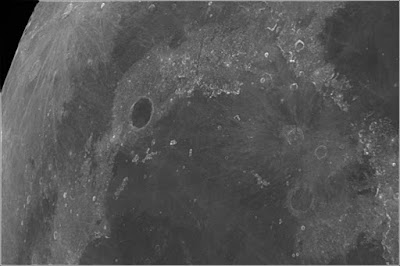Con
gran orgullo presentamos la edición de Mayo 2017 de la revista especializada en
la observación lunar más prestigiosa a nivel mundial: “The Lunar Observer”. Ya
son 22 meses consecutivos de observaciones lunares de la Sección Lunar de la
Asociación Entrerriana de Astronomía (AEA) aceptadas en la revista de la ALPO
(Association of Lunar and Planetary Observers).
La
revista se puede descargar de la web de ALPO: http://moon.scopesandscapes.com/tlo.pdf y también del
siguiente link: https://drive.google.com/file/d/0B-Dhf119f9EweGVjYWpYdDRwY2M/view?usp=sharing
En
la sección bimensual “Focus On” el tema eran los cráteres concéntricos, un
blanco muy difícil porque son todos extremadamente pequeños. Revisamos en
nuestros archivos y pudimos encontrar dos fotos en los que se observan cráteres
concéntricos (aunque sin detalle). De las 3 imágenes que ilustran el informe, dos
son nuestras (pag.9):
Hesiodus
A:
Name and location of
observer: Francisco Alsina Cardinalli (Oro Verde, Argentina).
Name of feature: Mare Nubium.
Date and time (UT) of
observation: 10-24-2015: 04.11.
Size and type of telescope
used: 250 mm .
Schmidt-Cassegrain (Meade LX 200).
Filter (if used): Oxigen
III Narrowband Filter-1.25
In .
Medium employed (for photos and electronic images):
Phillips SPC900NC webcam
Seeing: 7/10.
Archimedes
F:
Name and location of
observer: Francisco Alsina Cardinalli (Oro Verde, Argentina).
Name of feature: Archimedes.
Date and time (UT) of
observation: 12-20-2015-02:09.
Size and type of telescope
used: 250 mm .
Schmidt-Cassegrain (Meade LX 200).
Magnification
(for sketches): 168 x (with Telextender).
Filter (if used) : None.
Medium employed (for photos and electronic images) : Canon Eos Digital Rebel XS.
Filter (if used) : None.
Medium employed (for photos and electronic images) : Canon Eos Digital Rebel XS.
La
página 10 la ocupa nuestro artículo “Grove, a false bright ray cráter”, que
traducimos para una entrada anterior.
En
“Recent topographical observations” se mencionan las siguientes observaciones
(pág.13):
ALBERTO ANUNZIATO—PARANÁ,, ARGENTINA.
Digital image of Grove.
FRANCISCO ALSINA CARDINALI - ORO VERDE,
ARGENTINA. Digital images of Archimedes F & Hesiodius
A.
JOHN DUCHEK – St. LOUIS, MISSOURI, USA. Digital
image of Aristarchus Plateau.
HOWARD ESKILDSEN -
OCALA, FLORIDA, USA. Digital
image of waning crescent moon.
RICHARD HILL – TUCSON, ARIZONA, USA. Digital
images of Aristoteles, Fracastorius, Lacus Mortis, Mare Australe & Plato.
DAVID JACKSON - REYNOLDSBURG, OHIO, USA.
Drawing of Full Moon.
DAVID TESKE - STARKVILLE, MISSISSIPPI, USA. Drawing
of Neper.
STEVE TZIKAS - RESTON, VIRGINIA,
USA. Drawing of Macrobius-Tiesserand
En
la Sección “Lunar Geological Change Detection Program” (pág.16 y siguientes) aparecen
nuestras observaciones al programa:
Observations for February were received from
the following observers: Jay Albert (Lake Worth, FL, USA - ALPO) observed:
Albategnius, Aristarchus, Julius Caesar, Langrenus, the Lunar Eclipse, Mare
Crisium, Messier, Peirce, Picard, and Pitiscus. Alberto Anunziato (Argentina – AEA) observed: Mons Hadley. Kevin
Berwick (Ireland – ALPO) observed Aristarchus. Maurice Collins (New Zealand –
ALPO) observed Aristotles, Montes Caucasus and took some whole Moon images.
Anthony Cook (Aberystwyth University, UK) imaged the lunar eclipse. Marie Cook
(Mundesley, UK - BAA) observed Aristarchus. Phil Deyner (Hornchurch, UK – BAA)
imaged the Cichus area. Marcelo Gundlach (Bolivia IACCB) imaged Eudxus. Colin
Henshaw (Saudi Arabia – BAA) imaged the lunar eclipse. Rik Hill (Tucson, AZ –
ALPO/BAA) imaged Janssen. Franco Taccogna (Italy – UAI) imaged the lunar
eclipse and several features. Gary Varney (Prembroke Pines, FL – ALPO) imaged
the lunar eclipse and several features.
Observations for March were received
from the following observers: Jay Albert (Lake Worth, FL, USA - ALPO) observed:
Plato, Proclus, Ross D and Torricelli B. Alberto
Anunziato (Argentina – AEA) observed: Aristarchus and Curtius. Marie Cook
(BAA – Mundesley, UK) observed Aristarchus, Bullialdus, Darney, Gassendi, and
Vallis Schroteri. Les Fry (Elan Valley, UK – NAS) imaged several features. John
Duchek (Carrizozo, NM, USA – ALPO) imaged Theophilus. Rik Hill imaged Mare
Humboldtianum, Plato, and Vitello. Franco Taccogna (Italy – UAI) imaged
Aristarchus, Earthshine, Theaetetus, and several features. Paul Zeller (Indianapolis, IN, USA, - ALPO) imaged several features.
Anthony
Cook eligió dos observaciones nuestras para analizar reportes históricos de FLT
(fenómeno lunar transitorio). Una imagen de Desire Godoy sirvió para analizar
un reporte de 1975 de P. Foley en Plato:
Name and location of observer: Desiré Godoy
(Oro Verde, Argentina).
Name of feature: Plato.
Date and time (UT) of observation: 01-13-2017-03:02.
Size and type of telescope used: 200 mm . reflector (Meade
Starfinder 8).
Medium
employed (for photos and electronic images): QHY5-II.
Y
una observación visual de Alberto Anunziato de Aristarchus para analizar 6
reportes históricos.
Name and location of observer: Alberto Anunziato (Paraná, Argentina).
Name of feature: Aristarchus.
Date and time (UT) of observation: 03-05-2017 05:15 to 05:56.
Size and type of telescope used: 105 mm . Maksutov-Cassegrain (Meade EX 105).
Magnification:
154X




No hay comentarios.:
Publicar un comentario